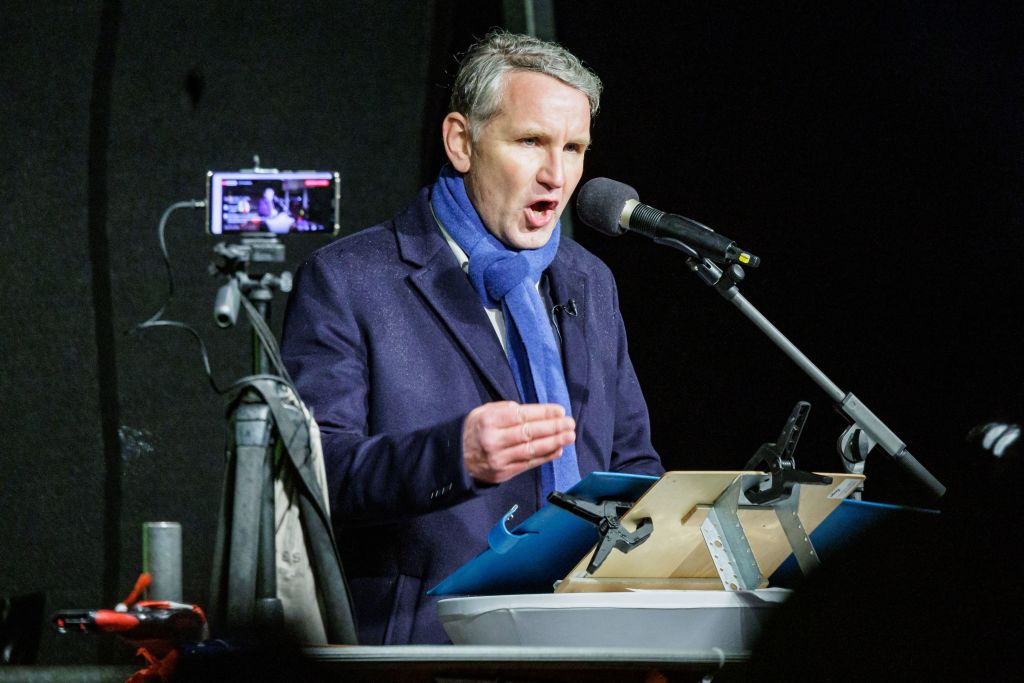How Germany’s far-right politicians became the Kremlin’s voice

In February, German parliamentarian Steffen Kotre, from the far-right party AfD (Alternative for Germany), was interviewed on Russian TV by the propagandist Vladimir Soloyvov. Kotre accused Western media of stirring up their populations against the Russian regime. He claimed that a significant proportion of Germans did not support the delivery of heavy weapons to Ukraine. His appearance on Soloyvov’s show, and his comments, sparked a wider debate in Germany about the AfD’s relationship with Russia.
The AfD, often labelled as a party of Putin-Versteher (‘Putin understanders’), isn’t the only German party that has had close ties with Russia. However, while other parties have actively distanced themselves from the Kremlin since Russia invaded Ukraine, the AfD increasingly contributes to Russian disinformation campaigns. High-ranking party members actively craft close diplomatic relationships with the Kremlin and Russian media, arguing that they have a right to foster diplomatic ties with Moscow.
Just days after Kotre’s controversial talk show appearance, two other German right-wing politicians appeared on the state-owned Russian TV channel Rossiya 1. They criticised Germany’s decision to obtain gas from non-Russian sources and supported the narrative that the West was complicit in the war. They fuelled rumours that labs in Ukraine were developing bioweapons to be used against Russia, a claim that has since been disproven.
By giving such interviews, German politicians signal that there’s more Western support for Russia’s invasion than there actually is, and help legitimise the Kremlin’s agenda among Russians. Exaggerating levels of support for Vladimir Putin in the West is likely to further fuel Russians’ perception of righteousness. The involvement of German political parties in helping spread Kremlin-fabricated narratives in Germany has a secondary consequence of manipulating German voters and individuals vulnerable to such misinformation, particularly some among the German–Russian minority and from the formerly Russian-controlled East.
The head of the AfD, Tino Chrupalla, claimed in a video interview that the US was at least partially responsible for the war and that it was the conflict’s main profiteer. Chrupalla implied that the US was involved in bombing the Nord Stream pipeline and is also quoted as saying, ‘The Americans are fighting on Ukraine territory until the last Ukrainian is dead.’ This narrative aims to weaken support for the US and the West among Germans, making the US out to be the aggressor and Russia as having no choice other than to defend itself. It’s also strikingly similar to claims made by Russian Foreign Minister Sergei Lavrov that the US is the ‘main guilty party’ in the war and that the strategic goal of NATO and the US is to ‘defeat Russia on the battlefield’ to significantly weaken or even destroy Russia.
In September last year, three AfD members announced their intention to travel to the Donbas region, a trip supposedly organised by Russia. One delegate said their intention was to ‘form their own impression of the Ukraine conflict … considering the skewed and biased news coverage’ of the war. The trip was cancelled after a public outcry.
At a right-wing-affiliated peace rally held on the first anniversary of the Russian invasion, the leader of the Thuringian branch of the AfD, Bjoern Hoecke, accused the US of involvement in the 2014 Maidan protests and the removal from power of former Ukrainian president Viktor Yanukovych. He claimed that the Donbas conflict that started in 2014 was a ‘silent civil war’ against eastern Ukrainians, and that Russia merely wanted to help ‘free eastern Ukrainians’. That version of history garnered the audience’s approval, and is likely to have been well received in the Kremlin.
These individuals are not outliers within the AfD. Internal working papers on the party’s foreign policy reflect the anti-American, pro-Russian position spread by individual members. The US is described as a ‘global hegemon’ and ‘alien power’. While one paper condemns Russia’s invasion of Ukraine, all other positions of the party reflect the Kremlin’s agenda, including calls for the lifting of sanctions against Russia and Belarus, putting the Nord Stream 2 gas pipeline into operation, stopping weapons deliveries to Ukraine and imposing an immediate ceasefire.
It’s important to note that some prominent AfD members have condemned their colleagues’ behaviour. Joanna Cotar, a member of the Bundestag, left the party because of its ‘ingratiation of the dictatorial and inhumane regime in Russia’. Another AfD Bundestag member, Norbert Kleinwachter, heavily condemned Kotre’s recent comments as ‘disgusting Putin propaganda’.
It’s difficult to measure the success of the AfD’s pro-Russia manipulation campaign. Multiple surveys over the past year have shown that most AfD voters disagree with the delivery of heavy weaponry to Ukraine, and around a quarter would support increased sanctions against Russia. Most voters from Germany’s other major parties support the delivery of weapons and an increase to sanctions, highlighting a significant divide between AfD followers and other German voters.
The AfD has positioned itself as Putin’s mouthpiece in German politics. It presents itself as the pro-peace party of the conflict, opposed to the anti-Russian, war-mongering German government and actively advocating an end to the conflict. But peace on whose terms? A ceasefire as envisaged by the AfD could well leave Ukraine stripped of the means to defend itself, and at Russia’s mercy. It would not be peace on Ukraine’s terms but a dictated peace, enabled by Ukraine’s unconditional surrender and resulting in a Eurasia dominated by Russia.
If Russian propaganda succeeds in swaying German public opinion, the German government could find politically unfeasible to continue providing Ukraine with weapons. But a decision to reduce or stop its weapon supplies to Ukraine would deliver a sizeable blow to Germany’s standing as a major European power and its reputation in the global order.